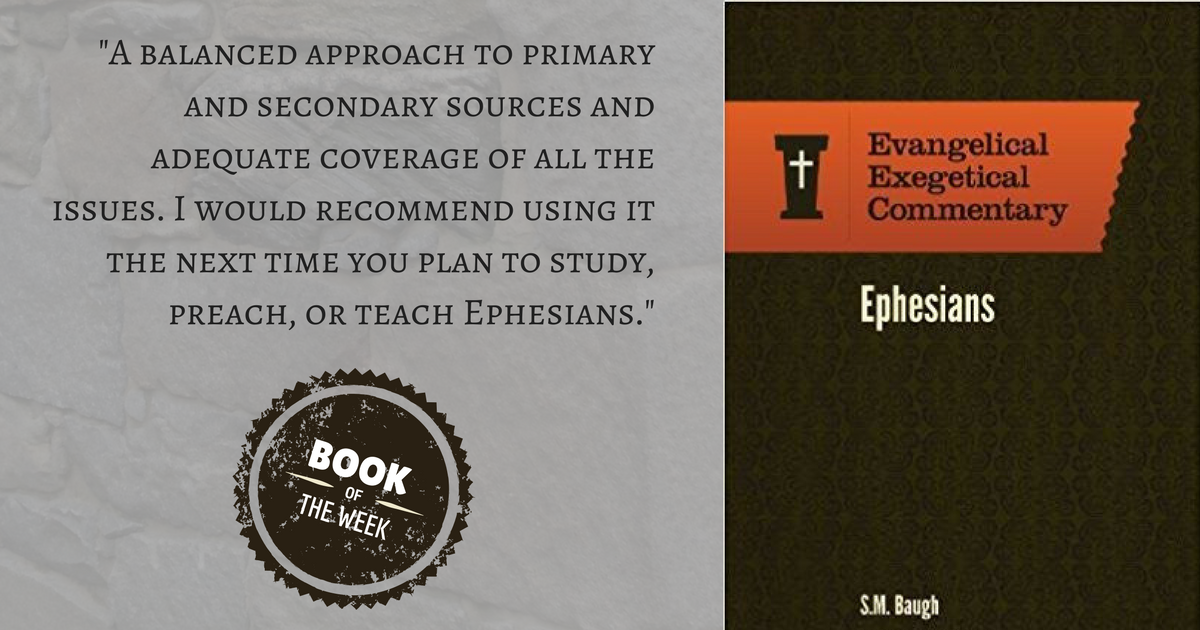
The new Evangelical Exegetical Commentary on Ephesians is definitely worth labeling a “go-to.” It has some unique features, but also the standard features you want to see in a new commentary on a book on which you may preach or teach.
Baugh takes Ephesians as “not a pure essay or a speech, but neither is it an informal letter” (12). This leads him to take an approach to the text that is based on rhythm. He therefore divides the text into cola, rather than modern sentences, since the ancients spoke of cola as the basic building blocks of discourse.
To give one practical example of how this differs from a typical approach, his analysis divides Eph 1:3-14 not into one sentence, but into nine cola. By doing so, Baugh both brings some objectivity into the method of dividing a text (a crucial concern for discourse analysis) and uses ancient categories for doing so. One may find this approach more or less helpful depending on whether they believe Paul wrote with these categories in mind (or one might find it helpful either way).
Baugh takes Paul to be the author, giving a useful summary of the typical arguments in his introduction and various reasons for his position that demonstrate some linguistic competence. Commentators are split about 50/50 on whether Paul wrote Ephesians, and it is an unfortunate feature of so many commentaries to take the text as deutero-Pauline, because the parallels drawn are then between Paul and a disciple of his, not between Paul and Paul. Baugh’s commentary is therefore useful for evaluating statements and theology in light of the other Paulines directly, rather than through some hypothetical pseudepigrapher.
The commentary itself is exactly what I like to see in my top five commentaries on a book. Within this top five, you will want different kinds, e.g., one hyper-critical, one hyper-conservative (perhaps even devotional), one incredibly detailed with a focus on secondary literature, one concise with a focus on the text, and one that shares all four of these qualities. For me, that final commentary used to be P. T. O’Brien’s, but since it’s now been pulled for citation issues, Baugh’s volume will be its replacement for me.
This commentary clearly covers all the secondary literature, but in a concise way. I like that the commentary remains focused on the text, rather than on discussions on the minutiae of the text in secondary literature. For example, the discussion of the descent in Eph 4:9-10 does not needlessly detain the reader for more than a couple pages, and the main three options for the descent are laid out in a paragraph. The major players are referenced, and Baugh lays out his own position briefly. He provides ample cross-references for the ideas contained within each of the three views.
Also helpful is his biblical-theological approach to the text. For Baugh, the main theme of Ephesians is “unity in the inaugurated new creation.” He rightly sees the new creation theme appearing especially in 2:11-22 and makes reference to it throughout in various passages, even some that might not be typically understood as being related to the new creation (or the new creational temple), such as “that Christ may dwell in your hearts through faith” (Eph. 3:17).
Finally, there is abundant discussion of textual variants in each section (as relevant), and a bibliography for each section to chase down more resources.
Overall, this commentary on Ephesians is one of my new go-to commentaries with a balanced approach to primary and secondary sources and adequate coverage of all the issues. I would recommend using it the next time you plan to study, preach, or teach Ephesians.
Preview or buy it here.

